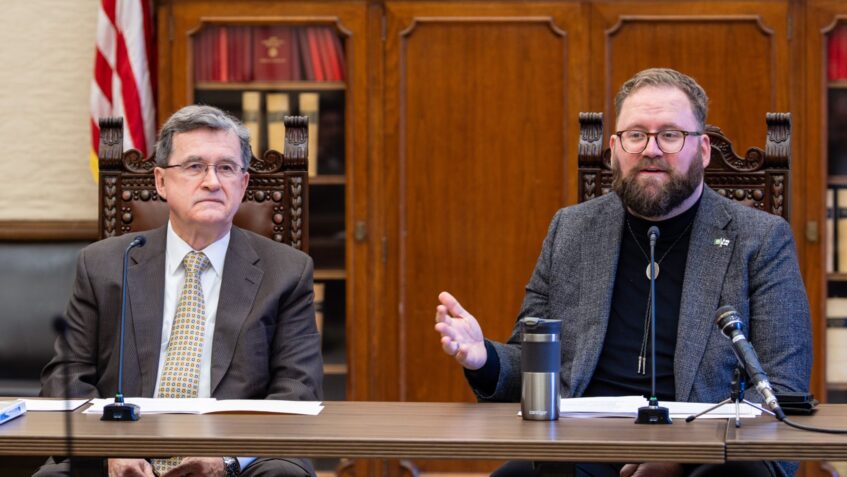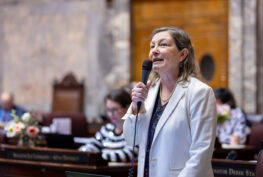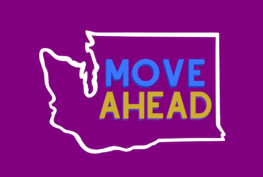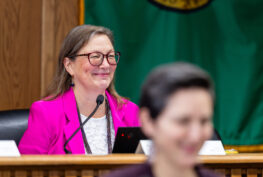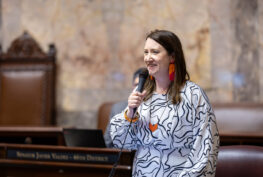OLYMPIA — The 2025-27 bipartisan transportation package passed the Senate Saturday.
The bipartisan package, which includes a spending plan, revenue bill, and bond bill, closes the $1 billion shortfall in the state’s budget for the 2025-27 biennium and commits funding levels through 2031. The balanced, six-year plan invests about $9.2 billion to ensure the state can complete promised projects, preserve and maintain infrastructure, and increase road safety.
“This is a year of budget challenges, but through a spirit of collaboration and compromise, we found a bipartisan solution to keep Washington moving ahead,” said Sen. Marko Liias (D-Edmonds), chair of the Senate Transportation Committee. “I appreciate Sen. Curtis King’s commitment to working together to create a plan that will deliver a safer and stronger transportation system for Washingtonians in every corner of our state.”
“Washington faces some serious transportation problems, from unsafe roads that contribute to a high number of traffic fatalities, to highway projects that are far from being completed, to a failing ferry system. The transportation budget passed by the Senate today reflects the collaboration and compromises from both sides as we try to fix our state’s transportation problems. Although there are parts of the Senate budget that our side doesn’t like and parts that the Democrats don’t like, we’ve worked hard and worked together to create a transportation budget that we hope will allow our state to finish long-awaited highway projects, improve safety on our roads and highways, and get our ferry system back on track,” said 14th District Sen. Curtis King, R-Yakima, the ranking Republican on the Senate Transportation Committee.
The package ensures key projects across the state continue as scheduled, including new ferries, the North Spokane Corridor, and improvements to Snoqualmie Pass and State Route 18.
“This budget takes an important step forward by funding more than 90% of the North Spokane Corridor project, setting us on a path to finish major construction by 2029,” said Spokane City Councilmember Jonathan Bingle during Tuesday’s public hearing on the package. “That’s a big deal for us, and we’re grateful to see the state’s continued investment in this long-awaited project.”
The package also represents the single largest investment in preserving and repairing the state’s aging infrastructure. Currently, Washington funds less than half of highway preservation need, and the package would increase that funding to 86% by 2031. Prioritizing repairs and long-term maintenance is a critical investment that ensures the state’s infrastructure remains safe and reliable.
With traffic fatalities at a 30-year high in Washington, the package allocates significant funding to make the state’s transportation system safer for drivers, pedestrians, and bicyclists. It includes more than $700 million for state and local safety projects, $366 million for active transportation projects to make it easier for people to walk and bike in communities, and $33.3 million to improve safety on rural roads and at railroad crossings.
During Tuesday’s public hearing on the package, Snohomish County Councilmember Megan Dunn said the county was excited the package included investments in multiple modes of transportation that people would see now, not just in the future.
“It makes investments that our residents will see now,” Dunn said. “We would also like to see these investments continue, as our transportation system should include safe and accessible options for all modes.”
The package also includes significant reforms — such as streamlining permit approval processes and centralizing environmental reviews for transit projects — to accelerate transportation construction while keeping costs low for taxpayers. It also gives the Washington State Department of Transportation more tools to deliver large construction projects by using alternative delivery methods and financing mechanisms.
“Business as usual isn’t working for our transportation system. That’s why we never considered pursuing new revenue streams without also looking for ways to improve how we do business,” Liias said. “The result is a sustainable, bipartisan budget that would ensure we can get things done for Washingtonians.”
Senate Bills 5161, 5800, and 5801 now move to the House for consideration.
The Senate has also introduced two additional transportation bills — one related to the 0.3% sales tax shift to the transportation budget and one related to fish habitat restoration — which are scheduled to be heard in committee next week.

